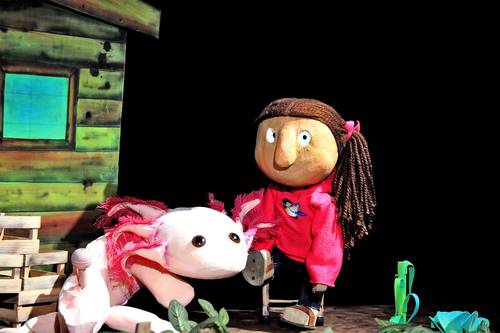They expose on stage the ecocide that led the axolotl to be at risk of extinction
The Mexican axolotl (Ambystoma mexicanum) It is an unusual creature. In cultural terms, it was associated in pre-Hispanic times with Xólolt, god of fire and lightning, who, according to myth, to avoid being sacrificed, took the form of that extraordinary amphibian and threw himself into the water, where he was found and buried. he killed him.
For the science of our time, it is still an impressive species and a reason for study due to its ability to regenerate its lost limbs and even part of the brain and heart, as well as to maintain itself. young
their entire life, which in captivity can exceed 20 years.
Denominated water monster
by the ancient Mexica, among whom it was highly appreciated for its meat and its use as a medicinal remedy, now it is the protagonist of the work Ayolotl, heart of water, which is presented on Saturdays and Sundays in May at 1 p.m. at the Teatro del Pueblo (República de Venezuela 72, Historic Center).
This production by Astillero Teatro – a company specializing in puppets for young audiences for almost 25 years – proposes a reflection from the performing arts, and from science, on the critical danger of extinction in which this species endemic to the lakes is found. from the Valley of Mexico that survives in Lake Xochimilco.
Interdisciplinary proposal
Written and directed by Oswaldo Valdovinos, it is a proposal aimed at children, whose objective is to raise awareness about the importance of biocultural heritage and its care, as well as the conservation and sustainable use of the biodiversity of the chinampera area of Xochimilco.
Its origin dates back to 2019 as part of the Scientific Vocations project, carried out with the Interdisciplinary Professional Unit of Engineering and Social and Administrative Sciences (UPIICSA) of the National Polytechnic Institute (IPN) and the collaboration of the Chinampayolo Cultural Cooperative and the Ministry of Culture of Mexico City.
The IPN asked us to address several issues aimed at children, such as urbanization, excessive use of pesticides, environmental preservation and harmful tourism. Instead of presenting these problems in isolation, we decided that they would be reflected or have an impact on one of the endemic species of this city.
explains Valdovinos.
We opted for axolotls because, although there are many other species that are also affected by these problems, we thought they were the most recognizable by children.
The work has as its starting point the documentary theater technique, from which bibliographic research and interviews with experts were undertaken, in addition to collecting testimonies among the members of the Chinampayolo cooperative about the main problems faced by the Chinampayolo area. the Mexican capital.
Instead of presenting hard data and statistics, we translated the information into language accessible to children. We avoid the didactic tone, about asking if what happens is okay
said the stage creator.
Our setups take care of that aspect. Rather, it is an expository work, because at Astillero Teatro we trust and appeal to the intelligence of children, but also their sensitivity, so that they are the ones who draw their conclusions according to the experience they have according to their age.
Through the use of table puppets with direct manipulation and object puppets, the history of Ayolotl, heart of water Its focus is on axolotls and the danger of extinction they are in due to the damage to their environment due to human intervention.
A glimpse of hope
The species, the director points out, is important not only for the biodiversity of the place, as it is an indicator of the natural balance of the chinampera area, but also in the cultural sphere, because the worldview of the pre-Hispanic settlers affirms that When axolotls disappear, humans will too
.
In the montage, what were once clean waters are today disrupted by the arrival of machine-monsters that demolish everything in their path, by house-beasts that trample the environment and vomit garbage and sewage, by alcoholic trajineras that dirty the canals and by a fumigator-monster that threatens to exterminate every living being.
Despite the gloomy panorama, this is not a sensationalist or alarmist setting, as it carries hope through the innocent gaze of a girl, Xóchitl, who proposes options to counteract the destructive acts of human beings.
The ticket price at the box office is 138 pesos; on Ticketmaster they are two for one. Upon arriving at the box office with the phrase: When the axolotls go extinct, so do we
the cost will be 38 pesos.
